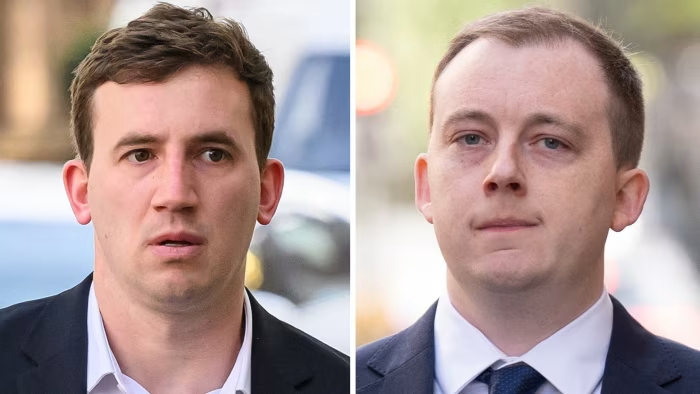Unlock the Editor’s Digest for free
Roula Khalaf, Editor of the FT, selects her favourite stories in this weekly newsletter.
The Crown Prosecution Service has said that a case involving alleged Chinese espionage in parliament collapsed after the government refused to provide evidence that China was a threat to UK national security.
In a letter on Tuesday, the CPS said it had repeatedly asked the government in recent months to provide evidence that China was a threat to national security at the time of the alleged offences, but was rebuffed.
Two British men — Christopher Cash and Christopher Berry — were in 2024 charged by the CPS with spying on parliamentarians at Westminster for China. Offences were alleged to have taken place between 2021 and 2023.
The two men were first arrested in 2023. Cash was a parliamentary researcher at Westminster who worked closely with MPs, and was the director of the China Research Group, a hawkish Conservative campaign group on China-UK relations.
Both Cash and Berry strongly denied any wrongdoing, and last month the CPS said it was dropping the charges against them. Their trial had been due to go ahead this month.
The CPS said the government’s refusal to provide evidence that China was a threat to UK national security was the key reason it abandoned the case.
“Efforts to obtain the evidence were made over many months,” the CPS said in the letter to the chairs of the House of Commons home affairs and justice committees.
The CPS said that while the government provided “further witness statements”, none of them “stated that at the at the time of the offence China represented a threat to national security”.
“By late August 2025 it was realised that this evidence would not be forthcoming,” the letter added. “When this became apparent, the case could not proceed.”
Sir Keir Starmer’s government has been coming under increasing pressure over the collapse of the China spying case, with critics claiming ministers were prioritising trade and investment with Beijing over national security.
Senior government officials have accused Starmer’s top security advisers of fatally undermining the CPS case against Cash and Berry, by refusing to provide the necessary court testimony about China for the purposes of the UK Official Secrets Act, the law under which the two men were charged.
There was a row at a meeting in September involving the Home Office, and attended by Jonathan Powell, Starmer’s national security adviser, Matthew Collins, deputy national security adviser, and Olly Robbins, permanent under-secretary at the Foreign Office, according to the senior officials.
The officials claimed the security advisers told the Home Office that Collins would not identify China as an “enemy” in court — which was seen as a key element of any successful prosecution under the Official Secrets Act.
That meant the CPS was no longer confident of securing convictions of Cash and Berry, and so decided to drop the case, the officials said.
In a trial earlier this year, prosecutors — backed by testimony from Collins — argued that an enemy included “any country which presents a threat to our national security”. Six Bulgarian nationals were convicted of spying on behalf of Russia in May as a result.
The Cabinet Office said on Sunday that Powell “did not take any decisions” about the content of Collins’s evidence in relation to the case against Cash and Berry.
It added it was “completely false” to say there was pressure from the top of the government to drop the case.
Some MPs fear the collapse of the case against Cash and Berry risks giving a green light to Beijing to spy at Westminster.
Alicia Kearns, a Conservative MP who was due to appear as a witness before the trial was abandoned, said: “We now know Labour didn’t even have to label China an ‘enemy’ for the trial to proceed, just provide evidence that China poses a threat to our national security and has done for years.
“For our own government to refuse to co-operate with the CPS is without doubt constitutionally improper. Labour has managed to undermine our law enforcement . . . and our prosecutors whilst sending a message to China they won’t protect our democracy.”
The CPS said on Tuesday that the decision to charge Cash and Berry in 2024 was correct but that a ruling in the Bulgarian spying case had clarified the need to seek further evidence that would show China was a threat to the UK’s national security at the time of the alleged offences.
Starmer sought to defend his government’s position on Tuesday, suggesting to reporters the evidence had to reflect the position of the previous Conservative government towards China when the offences were said to have taken place.
“You have to prosecute people on the basis on what was the state of affairs at the time of the offence,” Starmer, a former director of public prosecutions, said.
“As a prosecutor I know that if you’re going to prosecute a case like this, it is what was the situation at the time that matters.”
Conservative MPs have said it was clear that China was a threat at the time of the alleged offences, and that the UK security services had ample evidence of rising threats from Beijing.
The Foreign Office warned in June that “instances of China’s espionage, interference in our democracy and the undermining of our economic security have increased in recent years”.
Sir Ken McCallum, head of MI5, said in 2023 that more than 20,000 people in the UK had been approached online by Chinese spies, describing to the BBC “a sustained campaign on a pretty epic scale”.

